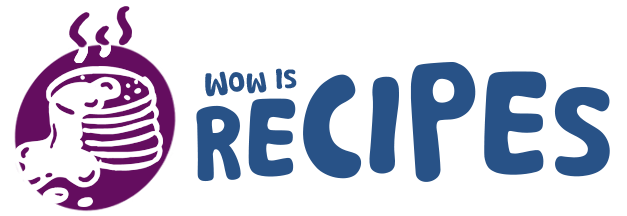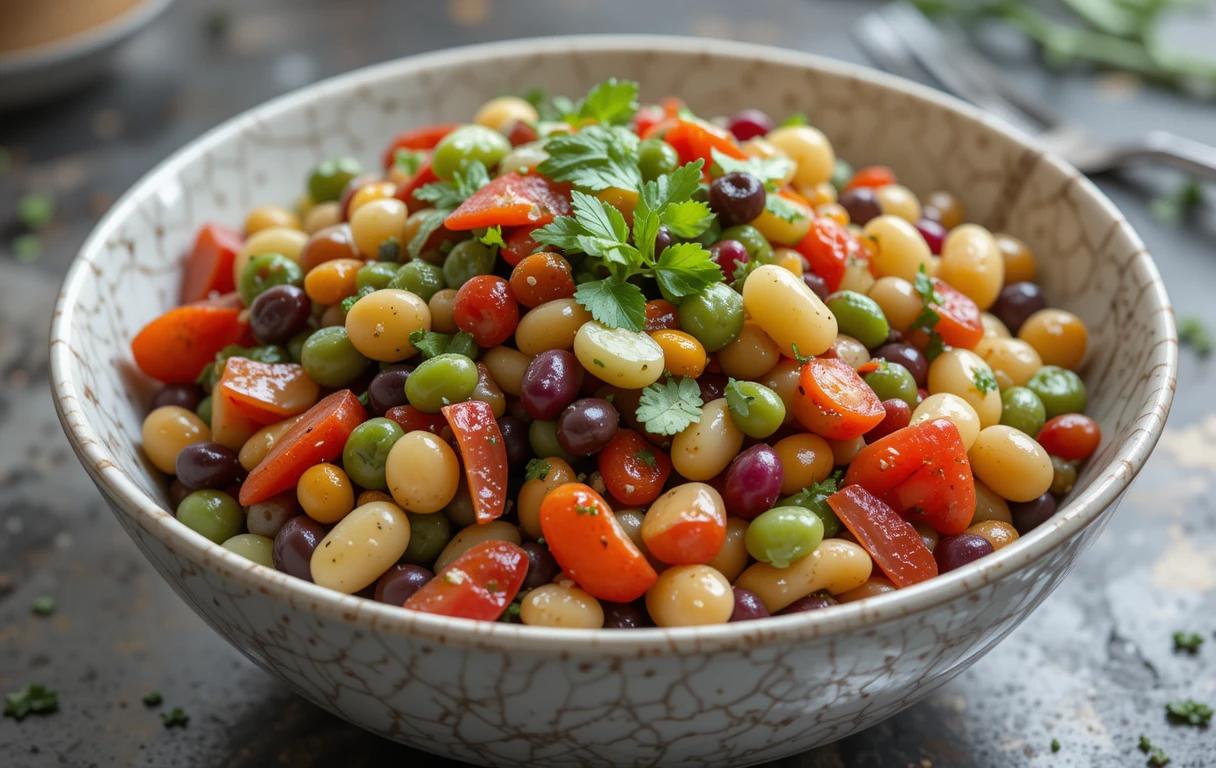Why Are Dense Bean Salads Good for You?
Dense bean salads have been making waves in the world of healthy eating, and for good reason! Packed with essential nutrients, these salads offer an excellent combination of taste, health benefits, and versatility. Whether you’re looking to improve digestion, boost energy levels, or simply enjoy a delicious plant-based meal, bean salads are a fantastic choice.
Dense bean salads are a powerhouse of nutrition, combining a variety of beans, vibrant vegetables, and often a flavorful dressing to create a meal that’s as satisfying as it is healthy. Beans—like black beans, kidney beans, chickpeas, and lentils—are loaded with plant-based protein, fiber, and essential vitamins and minerals. Paired with other nutrient-rich ingredients, they transform into a nutrient-dense meal that supports various aspects of your health.
In this article, we’ll explore why dense bean salads are good for you. From their ability to improve heart health and digestion to their role in weight management, these salads are much more than a simple side dish. We’ll also share tips on customizing bean salads to fit your dietary needs, discuss their benefits for vegetarians, and guide you on how to make your own perfect bean salad at home. Ready to uncover the secrets of this wholesome meal? Let’s dive in!
What Makes Bean Salads Dense?
Dense bean salads are defined by their nutritional richness and a wide array of ingredients. Unlike lighter green salads, these salads are hearty and satisfying because of the following key components:
- Variety of Beans:
Beans like black beans, chickpeas, pinto beans, and lentils form the base. These legumes are naturally rich in protein, fiber, and complex carbohydrates, which provide sustained energy. The diversity of beans adds layers of flavor and nutrition. - Nutrient-Dense Ingredients:
In addition to beans, these salads often include vegetables like bell peppers, cucumbers, and tomatoes, as well as healthy fats from avocados, nuts, or seeds. These add color, texture, and a variety of micronutrients like vitamin C, potassium, and omega-3 fatty acids. - Perfect Macronutrient Balance:
Bean salads offer a balance of protein, fiber, and healthy fats, making them incredibly filling. This balance also helps stabilize blood sugar levels and provides long-lasting energy. - Customizable Dressings:
Adding olive oil-based dressings or tangy vinaigrettes not only enhances the flavor but also increases the absorption of fat-soluble vitamins (A, D, E, K) from vegetables.
Nutritional Powerhouses: Key Nutrients in Dense Bean Salads
Dense bean salads are not just delicious—they are also a treasure trove of essential nutrients that support overall health. From protein to vitamins, these salads provide a wide array of benefits for the body. Let’s dive into the key nutrients that make dense bean salads such a powerful addition to your diet.
1. High Protein Content for Muscle Building and Repair
Beans are one of the best plant-based sources of protein, making them an excellent choice for vegetarians, vegans, and anyone looking to increase their protein intake.
- Why protein matters: Protein is essential for muscle repair, immune function, and the production of enzymes and hormones.
- Protein-rich beans to include: Black beans, chickpeas, kidney beans, and lentils all pack a protein punch, with each containing 6–10 grams of protein per half-cup serving.
Pairing beans with grains like quinoa or whole wheat bread creates a complete protein, ensuring your body gets all the essential amino acids it needs.
2. Fiber: A Digestive and Gut Health Superstar
Fiber is a standout nutrient in dense bean salads, with both soluble and insoluble fibers offering unique benefits:
- Soluble fiber: Helps lower cholesterol and regulate blood sugar levels.
- Insoluble fiber: Promotes healthy digestion and prevents constipation.
A single serving of beans can provide up to 10 grams of fiber, about 40% of the recommended daily intake for adults.
How it benefits you: Fiber feeds the beneficial bacteria in your gut, supporting a healthy microbiome and reducing inflammation throughout the body.
3. Rich Source of Essential Vitamins and Minerals
Dense bean salads are a goldmine of micronutrients, thanks to the beans and their accompanying ingredients:
- Iron: Beans like kidney beans and chickpeas provide plant-based iron, which supports oxygen transport in the blood.
- Potassium: Helps regulate blood pressure and supports muscle function.
- B Vitamins: Critical for energy production and brain health, especially folate (B9), which is abundant in beans.
- Magnesium: Vital for bone health, muscle function, and relaxation.
Pro Tip: To boost the absorption of plant-based iron, add a splash of citrus to your salad, such as lemon juice or orange slices.
4. Antioxidants for Fighting Free Radicals
Beans, especially colorful varieties like black beans and kidney beans, are rich in antioxidants, including flavonoids and polyphenols. These compounds combat oxidative stress, which can reduce the risk of chronic diseases like cancer, diabetes, and heart disease.
Bonus: When beans are paired with vegetables like tomatoes, red peppers, and leafy greens, you get an even higher dose of antioxidants, enhancing your body’s defense against damage caused by free radicals.
5. Low Glycemic Index for Stable Blood Sugar Levels
Dense bean salads are a fantastic option for people managing blood sugar levels. Beans have a low glycemic index, meaning they release glucose slowly into the bloodstream, preventing blood sugar spikes.
- This makes bean salads an ideal choice for diabetics or anyone aiming for steady energy throughout the day.
6. Omega-3 Fatty Acids (When Customized)
While beans are not a direct source of omega-3s, adding ingredients like chia seeds, flaxseeds, or walnuts to your salad can introduce these heart-healthy fats. Omega-3s are known for reducing inflammation and supporting brain and heart health.
How These Nutrients Work Together
Dense bean salads don’t just deliver individual nutrients—they combine them in a way that boosts your overall health. For example:
- The protein and fiber in beans help you feel full longer, which aids in weight management.
- Vitamins like folate and antioxidants work together to support heart and brain health.
Benefits of Dense Bean Salads for Heart Health
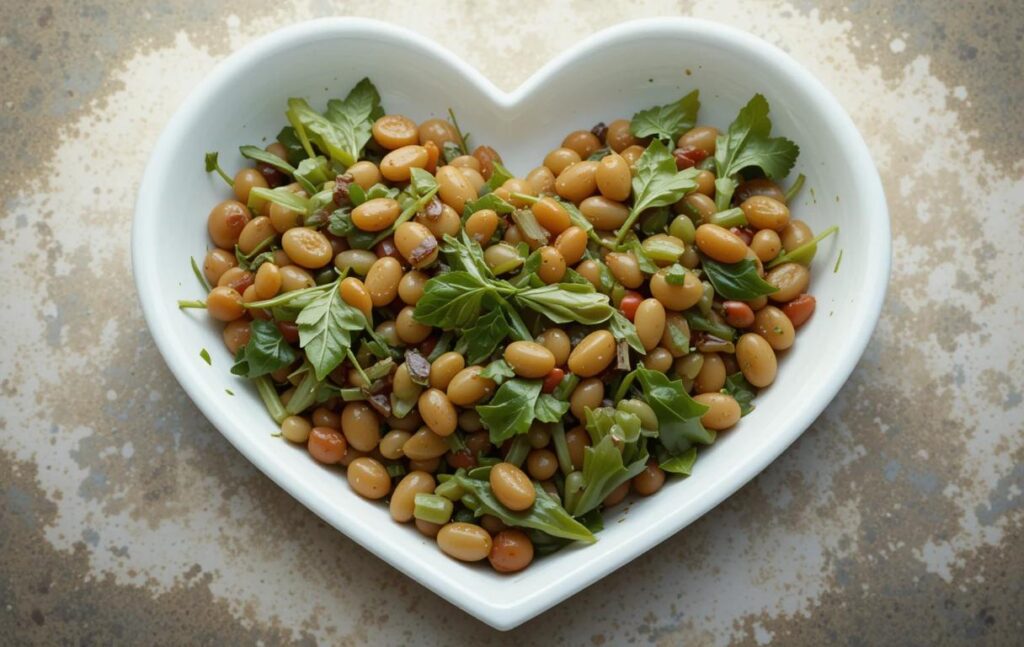
Dense bean salads are not just a delicious meal option; they are a boon for your cardiovascular system. Packed with heart-friendly nutrients like fiber, potassium, and antioxidants, these salads can play a key role in reducing the risk of heart disease and supporting overall heart health. Let’s break down the specific benefits.
1. Reducing Cholesterol Levels
Beans are naturally rich in soluble fiber, which helps lower LDL (low-density lipoprotein) cholesterol, also known as the “bad cholesterol.”
- How it works: Soluble fiber binds with cholesterol in your digestive system and prevents it from being absorbed into your bloodstream.
- Evidence: Studies have shown that consuming just one cup of beans daily can reduce LDL cholesterol by about 5%.
Including ingredients like chickpeas, black beans, or lentils in your salad can significantly contribute to healthier cholesterol levels.
2. Lowering Blood Pressure
Dense bean salads often include potassium-rich beans such as kidney beans and white beans. Potassium is a vital mineral that counteracts the effects of sodium and helps maintain healthy blood pressure levels.
- Beans with high potassium content: Black beans (up to 600 mg per cup) and white beans (about 800 mg per cup).
- How it helps: Adequate potassium intake relaxes blood vessel walls, improving circulation and reducing strain on the heart.
Adding fresh vegetables like cucumbers and tomatoes, which are also high in potassium, can enhance this benefit.
3. Promoting a Healthy Weight to Ease Heart Strain
Dense bean salads are low in calorie density and high in satiety, making them a perfect choice for those aiming to manage their weight. Maintaining a healthy weight reduces the strain on your heart, lowering the risk of cardiovascular diseases.
- How beans support weight management:
- High fiber content keeps you full longer, curbing overeating.
- Protein helps stabilize blood sugar levels and provides sustained energy.
4. Reducing Inflammation in the Body
Beans are loaded with antioxidants, which fight inflammation—a known contributor to heart disease.
- Key compounds: Flavonoids and polyphenols in beans like black beans and pinto beans help neutralize free radicals, reducing oxidative stress and inflammation.
Adding anti-inflammatory ingredients like olive oil, garlic, and spinach to your bean salad can amplify this effect.
5. Preventing Plaque Buildup in Arteries
Dense bean salads contribute to heart health by reducing plaque buildup, a major risk factor for atherosclerosis.
- The role of folate: Folate (vitamin B9), abundant in beans, helps regulate homocysteine levels in the blood. Elevated homocysteine is associated with artery damage and increased risk of heart attack or stroke.
- Vitamin C boost: Including vegetables like bell peppers and parsley in your salad can further protect your arteries by supporting collagen production and strengthening arterial walls.
6. Supporting Healthy Blood Sugar for Heart Health
High blood sugar levels can damage blood vessels and increase the risk of heart disease. Dense bean salads help regulate blood sugar levels due to their low glycemic index and high fiber content.
- How it helps the heart:
- Stable blood sugar levels reduce inflammation and prevent damage to blood vessels.
- Consistent energy levels from complex carbs and fiber in beans help reduce insulin spikes.
7. A Plant-Based Solution for Heart Health
Dense bean salads are inherently plant-based, which makes them an excellent choice for people aiming to reduce meat consumption. Plant-based diets are associated with lower risks of heart disease, thanks to their focus on fiber, healthy fats, and antioxidants.
- Why it works: Replacing animal proteins with plant proteins like beans can lower saturated fat intake, improving cholesterol and heart health.
Tips to Maximize Heart Health Benefits in Bean Salads
- Use low-sodium beans: Rinsing canned beans can reduce sodium content by up to 40%.
- Add healthy fats: Incorporate olive oil, avocado, or nuts for additional heart protection.
- Include fresh herbs: Parsley, cilantro, and basil not only enhance flavor but also provide additional antioxidants.
For more tips on heart-healthy diets, visit American Heart Association.
Boosting Digestive Health with Dense Bean Salads
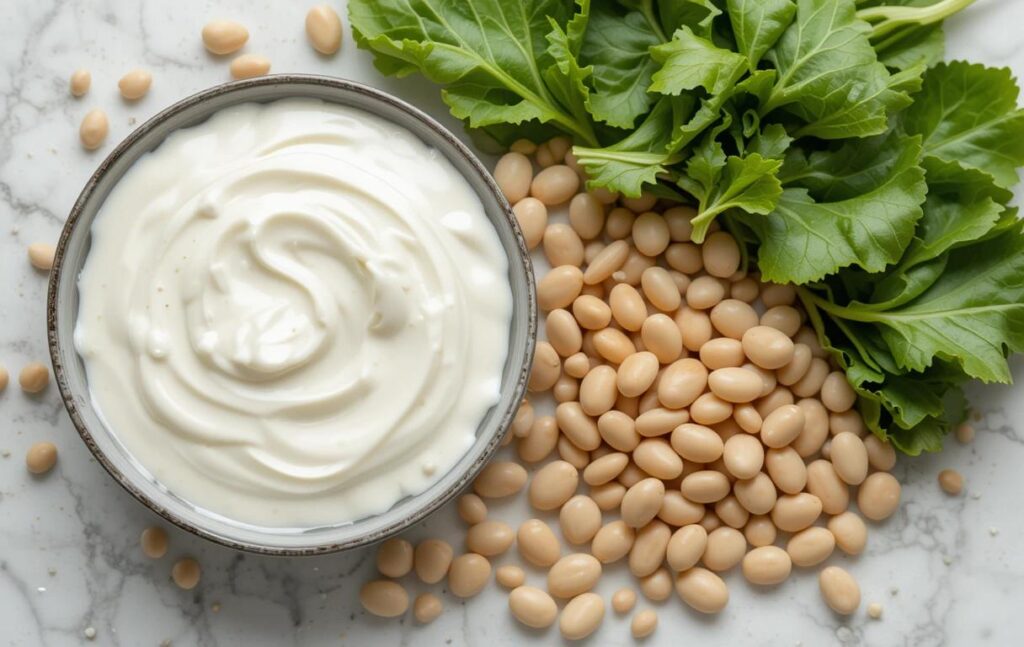
Dense bean salads are not only filling and flavorful but also incredibly beneficial for digestive health. The high fiber content and nutrient-rich ingredients work together to support a healthy gut, prevent digestive issues, and maintain regularity. Here’s how dense bean salads can be your digestive system’s best friend.
1. Fiber: The Digestive Superstar
Beans are a powerhouse of dietary fiber, which is essential for optimal digestive health. They contain both soluble and insoluble fiber, each playing a crucial role:
- Soluble fiber: Dissolves in water to form a gel-like substance, which helps slow digestion and supports the growth of beneficial gut bacteria.
- Insoluble fiber: Adds bulk to stool, promoting regular bowel movements and preventing constipation.
Examples of fiber-rich beans:
- Black beans: 15 grams of fiber per cup.
- Lentils: 16 grams of fiber per cup.
- Chickpeas: 12 grams of fiber per cup.
A single serving of a dense bean salad can provide up to 40% of your daily recommended fiber intake, making it a simple way to meet your digestive health goals.
2. Promoting a Healthy Gut Microbiome
The fiber in beans acts as a prebiotic, feeding the beneficial bacteria in your gut. A thriving gut microbiome is linked to numerous health benefits, including improved digestion, enhanced immunity, and reduced inflammation.
- How it works: As the fiber ferments in the gut, it produces short-chain fatty acids (SCFAs) like butyrate, which nourish colon cells and help maintain a healthy gut lining.
- Gut-friendly additions: Including fermented ingredients like yogurt-based dressings, kimchi, or pickled vegetables in your bean salad can further boost gut health.
3. Preventing and Managing Constipation
Dense bean salads are a natural remedy for constipation due to their high fiber and water content. Insoluble fiber in beans ensures that food moves smoothly through the digestive tract, preventing blockages.
- Best beans for constipation relief: Navy beans, kidney beans, and pinto beans.
- Hydration tip: Drink plenty of water alongside your bean salad to help the fiber work effectively.
4. Alleviating Digestive Disorders
For individuals with mild digestive disorders, bean salads can help regulate bowel movements and reduce symptoms of conditions like:
- Irritable Bowel Syndrome (IBS): Soluble fiber can ease diarrhea and promote stool consistency.
- Diverticulosis: Regular fiber intake from beans may prevent flare-ups and complications.
Note: People prone to gas or bloating from beans can minimize these effects by soaking dried beans before cooking or thoroughly rinsing canned beans.
5. Reducing Inflammation in the Digestive Tract
Beans and the vegetables often included in dense bean salads are rich in anti-inflammatory compounds:
- Antioxidants in beans: Black beans and kidney beans contain polyphenols that help reduce gut inflammation.
- Vitamin C in vegetables: Ingredients like bell peppers, tomatoes, and parsley provide vitamin C, which supports tissue repair and reduces oxidative stress in the digestive tract.
6. Regulating Blood Sugar for Digestive Health
Dense bean salads help stabilize blood sugar levels due to their low glycemic index. Balanced blood sugar levels are not only important for energy but also for gut health, as fluctuating levels can disrupt the balance of gut bacteria.
- How to enhance the effect: Combine beans with leafy greens, which are low in carbohydrates, for added blood sugar regulation.
7. Supporting Long-Term Digestive Health
Consistent consumption of fiber-rich foods like dense bean salads can lower the risk of long-term digestive disorders such as colon cancer. This is largely due to the protective effects of SCFAs produced during fiber fermentation and the antioxidant properties of beans and vegetables.
Tips to Maximize Digestive Benefits
- Prepare beans properly: Soak dried beans for at least 8 hours to reduce phytic acid and make them easier to digest.
- Include gut-soothing herbs: Add fresh ginger, mint, or dill to your bean salad to alleviate any potential digestive discomfort.
- Don’t overeat beans initially: Gradually increase bean consumption to allow your digestive system to adapt.
Plant-Based Protein Power: Why Dense Bean Salads Are Perfect for Vegetarians
Dense bean salads are an exceptional choice for vegetarians, offering a versatile, nutrient-rich, and satisfying source of plant-based protein. These salads provide essential nutrients that support overall health and are easy to incorporate into any diet. Here’s why dense bean salads are a game-changer for vegetarians and those exploring plant-based eating.
1. High-Quality Plant-Based Protein
Beans are a cornerstone of vegetarian diets because they are one of the richest plant-based protein sources. They contain 6–10 grams of protein per half-cup serving, making them a fantastic alternative to meat.
- Why protein is essential for vegetarians: Protein is crucial for muscle repair, immune function, and enzyme production. For vegetarians, beans bridge the gap by providing a sustainable, affordable, and nutritious protein source.
- Best protein-packed beans for salads:
- Black beans: 8 grams of protein per half cup.
- Chickpeas: 7 grams of protein per half cup.
- Edamame (young soybeans): 9 grams of protein per half cup.
2. Combining Beans for a Complete Amino Acid Profile
Beans are rich in protein but are often low in certain essential amino acids like methionine. However, by combining beans with other plant-based foods, vegetarians can achieve a complete amino acid profile.
- Complete protein combinations:
- Beans + rice (or quinoa).
- Beans + whole-grain bread or tortillas.
- Beans + seeds or nuts.
- Pro Tip: If you’re short on time, a bean salad that includes grains like quinoa or farro makes a complete, protein-rich meal in one bowl.
3. Sustainable Protein for the Environment
Dense bean salads not only nourish individuals but also contribute to a sustainable food system. Beans have a much lower environmental impact compared to meat and dairy production.
- Environmental benefits: Beans require less water, produce fewer greenhouse gas emissions, and enrich soil health through nitrogen fixation.
- Why it matters for vegetarians: By choosing beans over animal-based proteins, vegetarians can align their diet with eco-friendly and sustainable eating practices.
4. Rich in Nutrients Beyond Protein
Dense bean salads offer more than just protein—they come packed with nutrients that are particularly beneficial for vegetarians, including:
- Iron: Essential for oxygen transport in the blood. While plant-based iron is not as easily absorbed as animal-based iron, consuming it with vitamin C-rich foods (like tomatoes or lemon juice) enhances absorption.
- Calcium: Found in beans like white beans and chickpeas, which support bone health.
- Zinc: Important for immunity and cell repair, found in lentils and chickpeas.
- Vitamin B9 (Folate): Critical for energy production and cell growth, especially in beans like black-eyed peas and pinto beans.
5. Supporting Energy and Endurance
Dense bean salads are an energy powerhouse, thanks to the complex carbohydrates and protein they provide. These nutrients work together to fuel the body and maintain steady energy levels throughout the day.
- How it works:
- Carbohydrates from beans digest slowly, preventing energy crashes.
- Protein stabilizes blood sugar levels and supports sustained physical and mental performance.
For vegetarians engaging in fitness routines or endurance sports, dense bean salads are an excellent pre- or post-workout meal.
6. Versatility in Vegetarian Meal Planning
Dense bean salads are highly versatile and can be customized to suit various dietary preferences and culinary styles:
- Mexican-inspired: Black beans, corn, avocado, and a lime-cilantro dressing.
- Mediterranean-style: Chickpeas, cucumbers, tomatoes, and a lemon-olive oil vinaigrette.
- Asian twist: Edamame, shredded carrots, sesame seeds, and a soy-ginger dressing.
Their adaptability makes dense bean salads a go-to option for vegetarians who want variety in their meals.
7. Beans as a Budget-Friendly Protein Source
For vegetarians, affordability can be a concern when purchasing specialty protein sources like plant-based meat substitutes. Beans, however, are a cost-effective and widely available solution.
- Economical and accessible: Dried beans are even more affordable than canned varieties and can be prepared in large batches for meal prepping.
- Long shelf life: Both dried and canned beans can be stored for extended periods, making them a convenient pantry staple.
Tips for Making Bean Salads Even More Protein-Packed
- Add seeds or nuts like chia seeds, sunflower seeds, or almonds.
- Incorporate grains like farro or quinoa.
- Include tofu, tempeh, or hard-boiled eggs for additional protein if you’re an ovo-vegetarian.
Why Dense Bean Salads Are Perfect for Transitioning to a Plant-Based Diet
For those transitioning to a vegetarian or vegan lifestyle, dense bean salads provide an easy and nutritious way to meet protein needs while exploring plant-based options. They are filling, flavorful, and simple to prepare, making them a reliable staple for every stage of the journey.
How Dense Bean Salads Aid in Weight Management
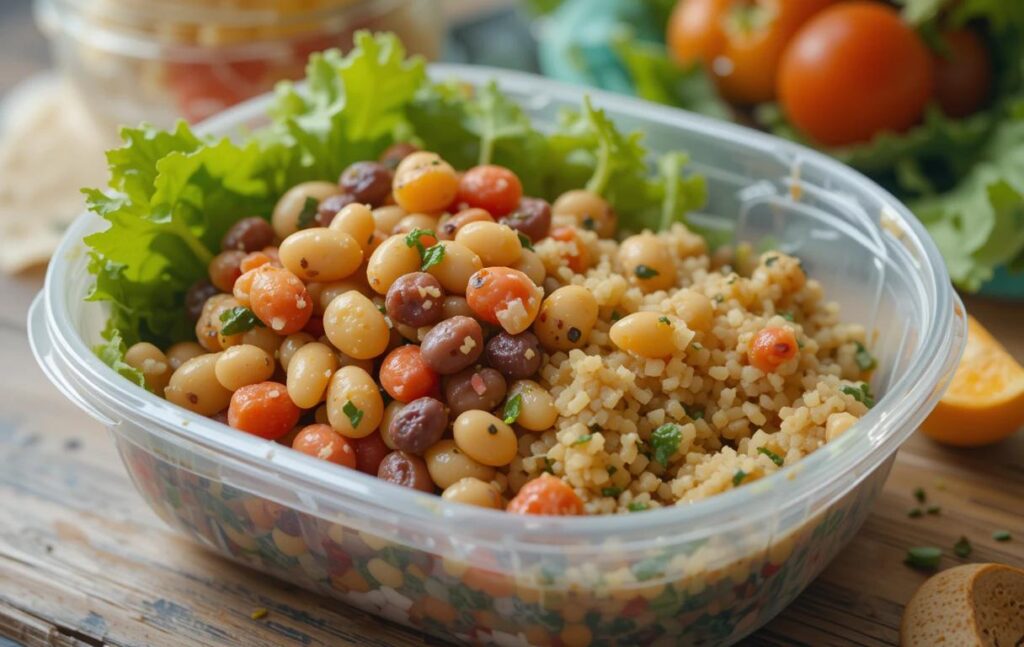
Dense bean salads are a fantastic choice for anyone looking to manage or lose weight in a healthy, sustainable way. They’re filling, low in calories, and packed with nutrients that support long-lasting energy and satiety. Here’s why these salads are ideal for weight management:
1. Low Calorie Density, High Nutrient Value
Dense bean salads offer fewer calories per serving while being rich in nutrients, a concept known as low calorie density.
- How it helps: You can eat a larger portion of a dense bean salad without consuming excessive calories, leaving you satisfied without overeating.
- Example: A cup of black beans contains only about 114 calories but is packed with protein, fiber, and essential nutrients.
2. High Fiber Content Keeps You Full Longer
The fiber in beans and vegetables is a key player in controlling hunger.
- How it works:
- Fiber slows digestion, helping you feel full for an extended period.
- It prevents blood sugar spikes that can lead to hunger shortly after eating.
Result: Reduced snacking and fewer cravings for unhealthy foods.
3. Balanced Macronutrients for Energy and Satiety
Dense bean salads provide a perfect balance of macronutrients—protein, fiber, and complex carbohydrates.
- Protein: Promotes muscle repair and keeps hunger hormones like ghrelin in check.
- Complex carbohydrates: Provide a slow, steady release of energy, unlike refined carbs that cause energy crashes.
- Healthy fats (when added): Ingredients like olive oil, avocado, or seeds enhance satiety by slowing digestion.
4. Controlling Portion Sizes Easily
Dense bean salads are naturally portion-friendly due to their hearty composition. Adding volumetric ingredients like cucumbers, tomatoes, and leafy greens increases the salad’s size without drastically adding calories.
- Pro Tip: Divide your dense bean salad into pre-portioned containers for easy meal prepping.
5. Helping Curb Cravings
The nutrient density of bean salads reduces cravings for sugary or high-fat foods. The protein and fiber combination stabilizes blood sugar levels, which are often responsible for triggering cravings.
6. Supporting a Sustainable Diet
Unlike crash diets that leave you feeling deprived, dense bean salads are enjoyable and satisfying. They’re easy to include in everyday meals, helping you stick to a healthy eating plan for the long term.
- Variety to keep things interesting: Switch up ingredients like beans, dressings, and vegetables to avoid monotony.
Customizing Dense Bean Salads for Your Nutritional Needs
Dense bean salads are highly versatile, allowing you to tailor them to fit your unique dietary and nutritional requirements. Whether you’re boosting protein, lowering calories, or enhancing flavor, you can easily adapt these salads to your needs.
1. Adding Healthy Fats for Satiety and Nutrition
Healthy fats not only improve satiety but also enhance the absorption of fat-soluble vitamins (A, D, E, and K) found in beans and vegetables.
- Great options to add:
- Avocado slices.
- Olive oil-based dressings.
- Nuts or seeds like sunflower seeds, chia seeds, or slivered almonds.
2. Boosting Protein Content
For those needing extra protein, dense bean salads can be enhanced with complementary ingredients.
- Vegetarian options: Quinoa, tofu, tempeh, or a boiled egg.
- Vegan options: Edamame, hemp seeds, or seitan.
3. Reducing Sodium Levels
If using canned beans, rinse them thoroughly to reduce sodium by up to 40%. Alternatively, use dried beans to control sodium levels entirely.
- Tip: Enhance flavor naturally with herbs, spices, and citrus juice instead of adding salt.
4. Including a Variety of Vegetables
Incorporate a rainbow of vegetables to maximize the salad’s nutrient profile.
- High-fiber options: Bell peppers, cucumbers, carrots, and cherry tomatoes.
- Leafy greens: Spinach, kale, or arugula add volume and antioxidants.
5. Experimenting with Flavor Profiles
Take your dense bean salad to the next level by experimenting with different seasonings and dressings:
- Mediterranean: Olive oil, lemon, parsley, and feta (optional).
- Mexican-inspired: Lime, cilantro, cumin, and a sprinkle of chili powder.
- Asian twist: Sesame oil, soy sauce, ginger, and garlic.
FAQs About Dense Bean Salads
Here are answers to some common questions about dense bean salads and their benefits:
- Do dense bean salads help with weight loss?
Yes! The combination of protein, fiber, and low-calorie density makes dense bean salads filling and ideal for weight loss. - Are canned beans as healthy as dried beans?
Canned beans are nutritious, but rinsing them reduces sodium. For complete control, use dried beans. - How can I reduce gas from eating beans?
Soaking dried beans overnight and rinsing canned beans thoroughly can minimize gas. Adding digestive aids like ginger or cumin can also help. - Can bean salads be eaten daily?
Absolutely! They’re versatile, nutritious, and suitable for daily consumption as part of a balanced diet. - What are the best dressings for dense bean salads?
Olive oil-based vinaigrettes, lemon-tahini dressings, or simple citrus and herb combinations are all great choices. - What beans are best for heart health?
Black beans, kidney beans, and white beans are excellent options due to their fiber, potassium, and antioxidant content.
Conclusion: Why Dense Bean Salads Are a Healthful Addition to Your Diet
Dense bean salads are a nutritional powerhouse that benefits your heart, digestion, and overall health. They’re rich in protein, fiber, and essential nutrients, making them perfect for weight management, supporting vegetarian diets, and enhancing gut health.
With endless customization options, these salads are easy to prepare, enjoyable to eat, and adaptable to any dietary preference. Whether you’re looking for a hearty main dish or a healthy side, dense bean salads are a versatile addition to your meals.
So, grab a bowl, toss in your favorite beans and veggies, and enjoy the health benefits of this delicious dish today!
Recipe: Dense Bean Salad
Meet Dense Bean Salad: The Easy Dish That’s Taking the Internet by Storm
